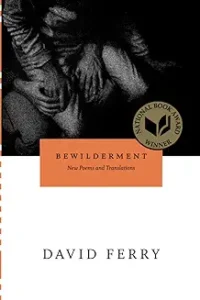Bewilderment: New Poems and Translations by David Ferry 2012
David Ferry died last week at the age of 99, a much honored and esteemed poet who taught at Wellesley College for more than 35 years. He is perhaps best known for his translations of the Aeneid, Horace’s Odes and other classical works as well as for his powerful contemporary poetry.
I had read ‘Bewilderment’ four years ago, but as with so much poetry which lacks the plot, characters, setting, and dramatic arc of the novel, I had no memory of having done so until I looked back in my BookMarks web site. Here is the review from 2019:
Bewilderment won the 2012 National Book Award for Poetry, bringing yet another honor to Ferry, at 88 years old, an emeritus English professor who taught at Wellesley for decades. Combining his translations of Latin poets including Horace, Virgil, Catallus, and Martial, with a translation of Genesis from an Anglo-Saxon version, with poems dedicated to Cavafy and Arthur Gold, a fellow English professor at Wellesley who died in 1989 at 53 years of age, and poems written over many years, this volume comes to grips with one’s bewilderment at loss, death, and what comes after death drawing upon the wisdom and experience over the millenia and bringing them to bear upon the reality of Ferry’s own life. The book is dedicated to his wife, Anne, a literary critic who died in 2006 and the loss of one’s wife is echoed in Ferry’s translations of the Virgil’s Orpheus and Eurydice as well as Aeneas’s story of how his wife was lost, separated from him, his father, and his son during their flight from the burning Troy. The loss of childhood seen most vividly in his translation of the Akidah is echoed in Ferry’s own reminiscences of childhood losses. In describing a tree from his childhood, he writes, “How did I ever know what the tree was called?/Somebody must have told me. I can’t remember./Whoever it was has become a shade imagined/From an ancient unrecoverable past.” This theme of loss and the bewilderment at the both loss and what is left in its wake is the central thread in this beautiful and memorable volume.
I think that review has aged well and summarizes my feelings having finished this book for the second time. Poetry lends itself to re-reading, each poem feeling fresh and new once again.
Ferry’s obituary from the New York Times https://www.nytimes.com/2023/11/11/books/david-ferry-dead.html contained ‘Lake Water’ a poem he wrote after his wife died:
When, moments after she died, I looked into her face,
It was as untelling as something natural,
A lake, say, the surface of it unreadable,
Its sources of meaning unfindable anymore.
Her mouth was open as if she had something to say;
But maybe my saying so is a figure of speech.



